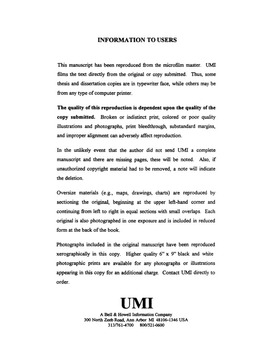| dc.contributor.advisor | Cavallo, Ann L., | en_US |
| dc.contributor.advisor | Abraham, Michael, | en_US |
| dc.contributor.author | Saunders, Georgianna L. | en_US |
| dc.date.accessioned | 2013-08-16T12:30:07Z | |
| dc.date.available | 2013-08-16T12:30:07Z | |
| dc.date.issued | 1998 | en_US |
| dc.identifier.uri | https://hdl.handle.net/11244/5670 | |
| dc.description.abstract | Results of the Learning Approach Questionnaire indicated that meaningful and rote learning approaches are unrelated approaches to learning. Type of instruction was not correlated with learning approach. However, the open-ended responses suggest that students' perceptions of classroom tasks influenced choice of learning strategies. | en_US |
| dc.description.abstract | This study investigated possible relationships among students' epistemological beliefs and approaches to learning, and examined the possible influence of teachers' implemented instruction on students' beliefs and learning approaches. The sample consisted of five chemistry laboratory teachers and 232 students. Relationships were investigated through observations of the teachers' instruction and using two student questionnaires. Instruction was characterized as either "more inquiry" or "less inquiry" based upon observational data. Scores from the questionnaires represented students' epistemological beliefs and learning orientations. | en_US |
| dc.description.abstract | The epistemological messages inherent in the two types of instruction did not appear in students' responses to the Science Knowledge Questionnaire. Some students showed strong beliefs in received knowledge; no students held strong beliefs in reasoned knowledge; and most students showed mid-range beliefs. In contrast, many students reported that they generated personal scientific knowledge during the chemistry laboratories. Perhaps these students had developed parallel ways of knowing about science. | en_US |
| dc.description.abstract | Rote learning approach was predicted by belief in reception of knowledge from authorities. Students who believed that knowledge comes from an external authority were more likely to attempt to memorize information than to "make sense" of the information for themselves. | en_US |
| dc.description.abstract | Students became a source of scientific knowledge when they were allowed to be and encouraged to do so. When the teacher presented himself as an authoritative source of knowledge, students accepted him as such. The justification for knowing in the chemistry laboratory appeared to depend upon the perceived source of knowledge. Agreement of a source of authority was the justification for knowing in less inquiry classrooms. Results of experimentation and logical reasoning were the justification for knowing in more inquiry classrooms. The epistemological assumptions of the instruction differed due to the ways teachers implemented the curriculum. Students' perceptions of instruction may have been influenced to a greater extent by the laboratory manual or their prior experiences than by their instructor. | en_US |
| dc.format.extent | xi, 130 leaves : | en_US |
| dc.subject | Chemistry Study and teaching (Higher) | en_US |
| dc.subject | Education, Sciences. | en_US |
| dc.title | Relationships among epistemological beliefs, implementation of instruction, and approaches to learning in college chemistry. | en_US |
| dc.type | Thesis | en_US |
| dc.thesis.degree | Ph.D. | en_US |
| dc.thesis.degreeDiscipline | Department of Instructional Leadership and Academic Curriculum | en_US |
| dc.note | Source: Dissertation Abstracts International, Volume: 59-07, Section: A, page: 2432. | en_US |
| dc.note | Co-Chairs: Ann L. Cavallo; Michael Abraham. | en_US |
| ou.identifier | (UMI)AAI9839804 | en_US |
| ou.group | Jeannine Rainbolt College of Education::Department of Instructional Leadership and Academic Curriculum | |
